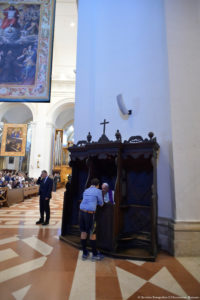IN EXILE

Father Ron Rolheiser
By Father Ron Rolheiser, OMI
Taste is subjective. Keep that in mind as I share with you the ten books that most touched me this past year. That isn’t necessarily a recommendation that you read them. They may leave you cold, or angry at me that I praised them. Be your own critic here and one who isn’t afraid to be critical of my taste. Nobody buys everything that’s advertised in a store.
So, what ten books most touched me this year?
First, I single out some wonderful religious biographies:
• Kate Hennessey’s, Dorothy Day, The World Will be Saved by Beauty. To my mind, this book is a treasure. As Dorothy Day’s granddaughter, Kate Hennessey had a privileged, intimate relationship with Dorothy, but that relationship also had its headaches and heartaches. Dorothy was a complex person who when called a saint, reacted by saying: “I don’t want to be dismissed that lightly!” This book captures both the saint and the woman resistant to that label.
• Jim Forest, At Play in the Lion’s Den – A Biography and Memoir of Daniel Berrigan. A great insight as to who Daniel Berrigan was as a man, as Jesuit, as a friend, and as a prophet. There will be numerous biographies still written on Berrigan, but none, I venture to say, will surpass this one. Forest knows his subject well.
• Suzanne M. Wolfe, The Confessions of X, A Novel. This is fictional biography, a story of St. Augustine’s mistress, Augustine’s love for her, their child, and St. Monica’s role in breaking up that relationship. Not historical, but researched well-enough to make it credible.
Next, some religious autobiographies:
• Kareem Abdul-Jabbar, Coach Wooden and Me, Our 50-Year Friendship On and Off the Court. You may wonder why I list this book as religious autobiography, but it only needs to be read to answer that question. This isn’t a sports book, but a book that reflects deeply on life, meaning, friendship, race, and religion. Raised a Roman Catholic, Kareem Abdul-Jabbar shares very candidly on what prompted his religious move to Islam. There are lessons to be learned here. This is a wonderfully warm story amidst all the pain it shares.
• Macy Halford, My Utmost, A Devotional Memoir. As an Evangelical Christian, Halford grew up with a deep faith, but one that wasn’t strongly challenged in her youth. As a young woman she moved to New York and then later to Paris to become a writer. Surrounded now mostly by friends and colleagues who consider faith a naiveté, she struggled to root her childhood faith more deeply so as to withstand the challenge of the new world she lives in. Her struggle and her eventual solid landing within the faith of her childhood can be a help to all us, regardless of denomination, as we struggle to keep our faith in an overly-adult world.
• Bryan Stevenson, Just Mercy, A Story of Justice and Redemption. Bryan Stevenson is a Harvard-educated lawyer who has chosen to put his talents to work in helping the poor, in this case, prisoners on death row who don’t have any means of helping themselves. The issues of racism, poverty, inequality, and how we blind ourselves to them, are front and center in this powerful book.
• Nina Riggs, The Bright Hour – A Memoir of Living and Dying. Nina Riggs died in February and this book shares her blogs as she, a young mother with two preteen children, journeys through terminal cancer, alongside her best friend, also a young mother, who is dying of cancer as well. They died a week apart. While Riggs doesn’t write out of an explicit faith, she faces both life and death with a courage, buoyancy, and wit that will make a saint envious. A delightful, deep book: you’ll laugh, you’ll cry – and you’ll learn how death can be faced.
A fine book in the area of Existentialism:
• Sarah Blackwell, At the Existentialist Café, Freedom, Being, and Apricot Cocktails. This is one of the best books written on Existentialism that’s accessible to a non-professional reader. It will introduce you to the giants of Existential philosophy: Sartre, Heidegger, Simone de Beauvoir, Merleau-Ponty, Camus, Husserl and Jaspers. Bakewell believes you will understand a thinker’s philosophy much more accurately if you also have a picture of his or her life: “Ideas are interesting, but people are vastly more so.” Those without a background in philosophy will get lost occasionally but if you continue reading you will soon find yourselves again fascinated by the lives of these famous, colorful thinkers.
Finally, two books on spirituality, where the author’s pedigree is sufficient recommendation:
• Tomas Halik, I Want You to Be – On The God of Love. Halik, a Czechoslovakian priest, is a renowned spiritual writer, winner of the Templeton Prize. This is a book of rare insight and depth.
• Henri Nouwen, Beyond the Mirror, Reflections on Death and Life. Nouwen needs no introduction, though this is a unique book within his corpus, chronicling his near-death experience after a serious accident.
Taste may be subjective, but these are good books!
(Oblate Father Ron Rolheiser, theologian, teacher and award-winning author, is President of the Oblate School of Theology in San Antonio, TX.)





